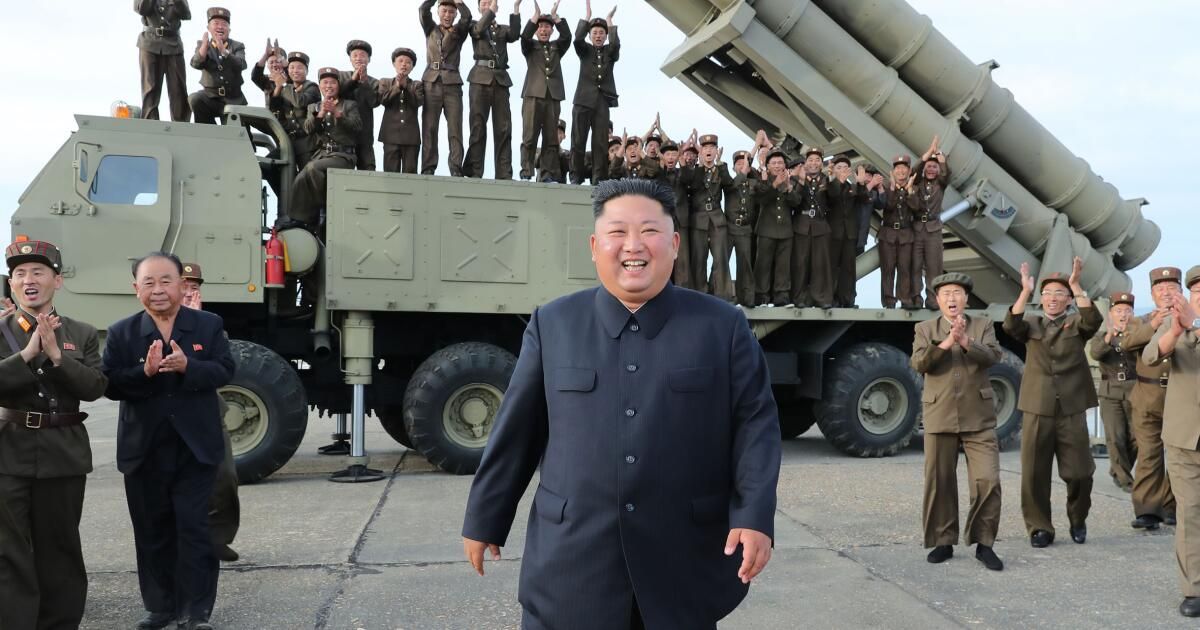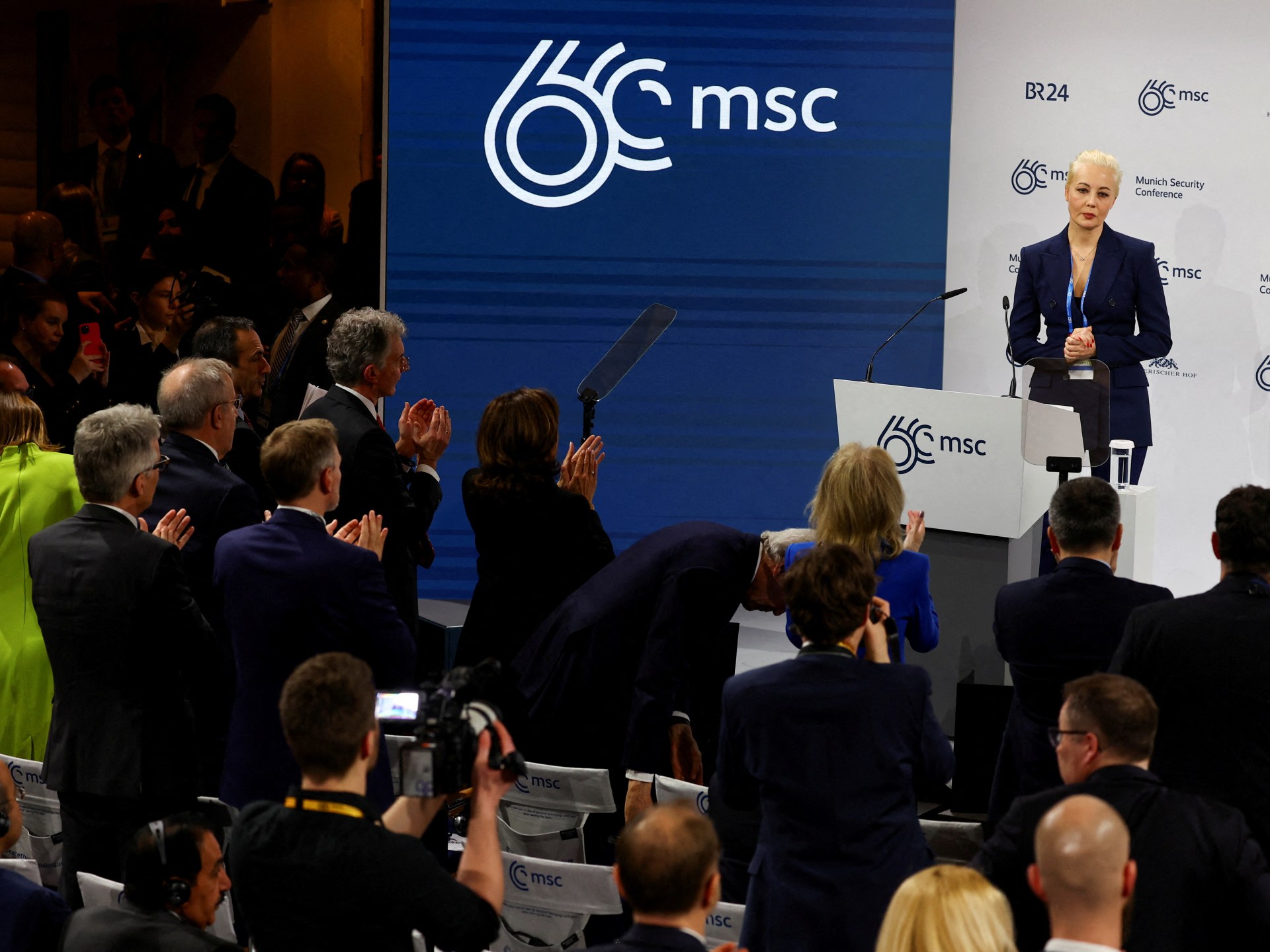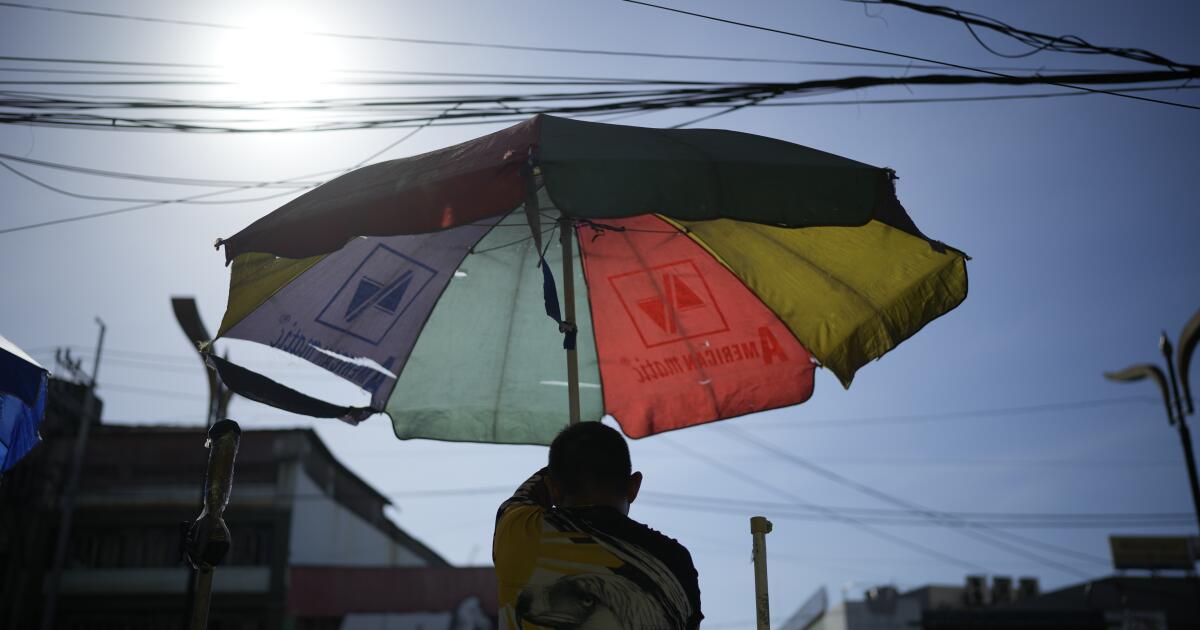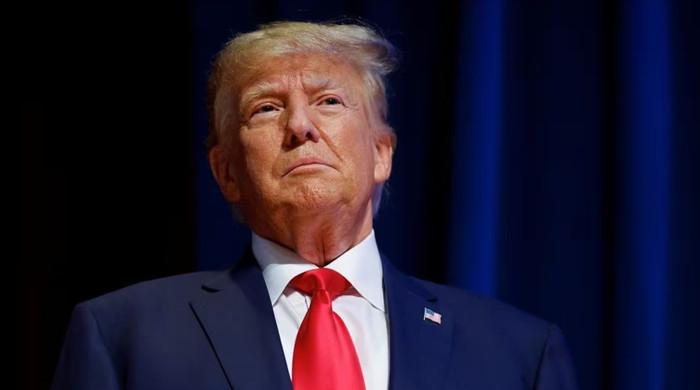In the face of other, more pressing developments in Ukraine and Gaza, the Biden administration has largely maintained the threat of North Korea's nuclear program. in the background.
But tensions over the Korean Peninsula have been rising for years, opening a new and uncertain chapter in a standoff that, just six years ago under then-President Trump, seemed on the verge of a breakthrough.
So what happened? And what awaits whoever wins the White House in November?
In 2018, there were high hopes that North Korea could finally give up its nuclear arsenal.
Following three summits between then-South Korean President Moon Jae-in and North Korean leader Kim Jong Un, the two countries issued a joint statement promising better relations between the countries. the easing of military tensions and a mutual commitment to the “denuclearization of the Korean Peninsula.”
That unprecedented document, the Panmunjom Declaration, set the stage for meetings between Trump and Kim Jong Un, who until then had been insulting each other, with Trump disparaging Kim as “little rocket man” and Kim calling Trump a “dotard,” or a senile old man.
Held throughout 2018 and 2019 in Singapore, Hanoi, and the Korean Demilitarized Zone, the three meetings produced several gestures of goodwill, including Pyongyang's repatriation of the remains of American soldiers who died in the Korean War. and the dismantling of several rocket launch sites. At the DMZ, Trump became the first sitting US president to set foot on the North Korean side of the border.
But the meetings failed to reach a denuclearization agreement, encountering the same intractable problem. that has defined the conflict for decades: the United States' reluctance to accept anything less than immediate and complete nuclear disarmament and North Korea's equal reluctance to give up its main source of influence.
Things have been going downhill since then.
Then-President Trump meets with North Korean leader Kim Jong Un in the border village of Panmunjom in the Korean Demilitarized Zone on June 30, 2019.
(Susan Walsh/Associated Press)
In June 2020, North Korea blew up a joint liaison office that had been set up on its side of the border to facilitate communication with Seoul. It also resumed its nuclear program, rebuilding the nuclear test site it had partially demolished following the Panmunjom Declaration.
North Korea It has launched more than 100 missiles since 2022, and U.S. and South Korean officials have said it is likely preparing to conduct its seventh nuclear test, the first since 2017.
In September 2022, North Korea passed a law officially declaring itself a nuclear state and Kim Jong Un promised that the country would “never give up” its nuclear capability. arsenal, which is estimated to contain at least 40, and perhaps more than 100, nuclear warheads.
The new The law specifies several scenarios in which the country would use nuclear weapons, including preemptive strikes in the event of an imminent attack.
As a result, recent years have seen increasingly flammable military posturing by both Korea and the United States.
“Obviously, North Korea has never had so many nuclear weapons, especially those of such technological sophistication, in terms of delivery methods or range of attack,” said Kim Dong-yup, a professor at the University of North Korea Studies. in Seoul.
“But all the negotiation channels or mechanisms that North and South Korea had to avoid escalation or misunderstandings have disappeared. “The safety pin has been removed.”
In response to North Korea's growing nuclear power, the Biden administration resumed military exercises with South Korea that had been suspended under the Trump administration. He has said that any nuclear attack by North Korea “will result in the end of that regime.”
South Korea has also been honing its strategy to decapitate the North Korean leadership, while Kim Jong Un, who recently repudiated the once shared goal of Korean reunification, called South Korea the “main enemy” of his regime. Given these competitive moves, altercations seem inevitable, experts say.
“I don't think the chances of a full-blown war are particularly high, because there is now a greater deterrence element at play,” Professor Kim said. “But the likelihood of smaller-scale conflicts has increased significantly, especially in areas near the border with North Korea.”
Technically, the Korean War never officially ended. Hostilities ceased in 1953 with an armistice, not a peace treaty.
Biden, if re-elected, is expected to continue his current strategy of maintaining sanctions and military deterrence, maintaining his broader regional strategy of expanding US influence in Asia.
Under President Yoon Suk-yeol, a conservative, South Korea joined a U.S.-led trilateral military alliance with Japan, a buffer against China and North Korea.
But that does not mean the door to dialogue with North Korea. is closed.
In March, senior U.S. officials said they would be open to exploring “interim steps” toward denuclearization with North Korea, but that the goal of nuclear disarmament remains unchanged.
However, this is essentially the same offer that has failed to produce significant results in the past (including the Trump-Kim summits) and North Korea has been ignoring the Biden administration's attempts to make contact.
“The worst kept secret in the Korean political community is that demanding the denuclearization of North Korea is impossible, totally unrealistic,” said Van Jackson, a former Pentagon official and currently a professor of international relations at Victoria University of Wellington in New Zealand. .
“North Korea will return to the negotiating table only if it receives presidential honors such as summits or tangible agreements that signal a turning of the page: sanctions relief, end to the Korean War,” he said.
“There is a way in which North Korea's position here is understandable,” Jackson added. “They have no intention of denuclearizing and it would be foolish to disarm without having confidence that their much larger adversary is no longer really a larger adversary. “
A Trump victory would involve many more variables.
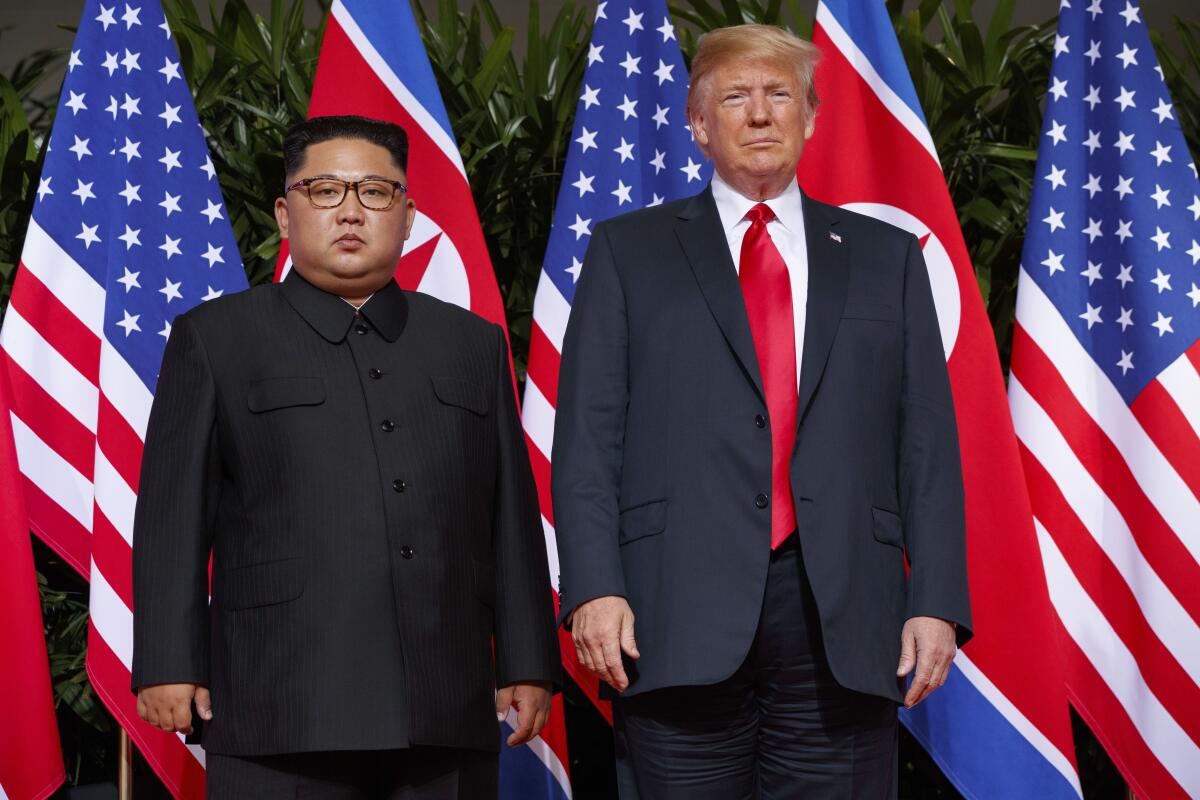
President Trump and North Korean leader Kim Jong Un at their first summit, held in Singapore on June 12, 2018.
(Evan Vucci / Associated Press)
“The assumption is that if Trump approaches Kim, they will immediately resume their love letters, but we must remember that Kim was surprised and fed up by Trump's team in Hanoi, so he won't necessarily go running to Trump.” said Andrew Yeo, senior fellow at the Brookings Institution.
In other words, once faced with the prospect of a breakthrough deal that never materialized, a more cautious Kim may not rush to do it again.
“In addition, the geopolitical landscape has changed and Kim has much more support from China and Russia than during the first Trump administration, so he may have less incentive or need to talk to the United States,” Yeo said.
In May 2022, China and Russia vetoed a U.S.-led effort in the United Nations Security Council to increase sanctions on North Korea, which in recent years has moved closer to Moscow, a target of sanctions over the invasion. from Ukraine.
Following his meeting with Vladimir Putin in September 2023, Kim Jong Un sought Russia's help to launch his own spy satellites, sending artillery shells, mortars and short-range ballistic missiles in return for Russia's war with Ukraine.
Still, many experts in Asia believe that dialogue with North Korea is more likely under Trump than under Biden, with the possibility of a second round of high-level meetings on the table.
“If Trump wins, I hope Kim hits the 'Hey, do you remember me?' button. Button and resume summit diplomacy,” Jackson said. “But it's not entirely clear how Trump would respond to that this time.”
In the case of another summit, the question is how much ground Trump would be willing to give up to consummate a deal in his favor: whether he could, for example, be open to a nuclear freeze rather than disarmament.
“The bureaucracy under Trump will continue to have hard preferences, but if Kim Jong Un is able to manipulate Trump, it is much more likely that this time Trump will be able to impose his preferences on Korea,” Jackson said. “In 2018 and 2019, Trump faced a lot of resistance from public officials and political appointees, but MAGA has since created a cadre of loyalists who will exist to ensure Trump's whims are met.”
However, even dialogue that does not lead to clean agreements can be worthwhile as a kind of pressure valve, a way to ease rising tensions, said Professor Kim Dong-yup.
“It provides an opportunity to rethink and moderate hostile positions,” he said. “And once you start talking, over time new solutions can emerge.”

